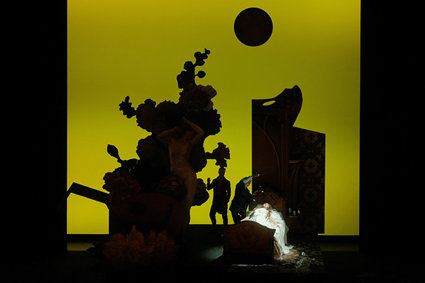| Opera Reviews | 25 April 2024 |
Mascagni's Zanetto plays to a live audience in Veronaby Silvia Luraghi |
|
Mascagni: Zanetto
|
|

|
|
|
As performing arts venues are finally being re-opened all over Italy, the curfew rules imposed by COVID-19 containment measures mean that they have to organize their programs under dire conditions. In these circumstances, the solution found at Verona’s Teatro Filarmonico was to revive a one act title by Pietro Mascagni, at the same time offering the public a real rarity. This was Zanetto, a 40 minute long opera with a libretto by Giovanni Targioni-Tozzetti and Guido Menasci, based on a translation of a play by François Coppée, Le passant (The passer-by), that had premiered in 1869 with no less than Sarah Bernhardt as Zanetto. Mascagni’s work was intended as a contribution to the 1896 celebrations for Rossini annually held at the Liceo Musicale in Pesaro. The premiere was successful, maybe partly on account of Mascagni being the director of the Liceo Musicale, but when Zanetto moved to La Scala a couple of weeks later, it was met with much less enthusiasm. In spite of this, it still enjoyed a comparatively rich performance history in the late 19th-early 20th century, as it adapted to smaller theaters and private performances. In order to honor Rossini, Mascagni devised a stylistically refined piece of music, with a chamber orchestra playing a score echoing Renaissance tunes. The simple plot only features two singers, a soprano, the courtesan Silvia and a mezzo, the minstrel Zanetto singing en travesti. In Verona, the roles were played by soprano Donata D’Annunzio Lombardi and mezzo Asude Karayavuz, and the limited size of the orchestra adapted well to the preset social distancing measures. The production by Alessio Pizzech set the action at the time of the composer, with the liberty sets designed by Michele Olcese. The opera starts with the chorus singing a cappella offstage in a crepuscular atmosphere with the moon illuminating Silvia’s bedroom. A man wakes up at her side, smokes a cigarette and leaves while she is still sleeping. When Silvia wakes up, she complains about her life: in spite of all the lovers that have flirted with her, she cannot find real love. A minstrel reaches Silvia’s mansion and sings outside her window. Silvia is moved by the innocence of the young man, who tries to gain her love. When she refuses him, Zanetto says that he will then look for the famous Silvia of whose charms he has heard but who he has never seen. Fearing to harm him, Silvia warns him until she convinces him to give up his search and leave. She remains alone again, regretting having lost maybe her only chance of real love. Both singers sang and acted with great commitment. As Silvia, Donata D’Annunzio Lombardi could rely on her earlier experience with verismo, and managed the score, especially demanding on the soprano who must depict a multifaceted character with her interior struggle. Zanetto is psychologically less complex, and Asude Karayavuz was perfectly cast as the naive youth, displaying a nicely colored, nuanced and well tuned voice. The orchestra was conducted by Valerio Galli, and had already given the audience the opportunity to enjoy its skills with a choice of instrumental music from Verismo operas that preceded the opera, including Pietro Mascagni’s overture from Le maschere and two Intermezzos, from Guglielmo Ratcliff and Cavalleria rusticana, Alfredo Catalani’s prelude to the third act from La Wally and Francesco Cilea’s Intermezzo from Adriana Lecouvreur. Even though only a limited number of seats could be occupied due to the current containment measures, the performance was met with a very warm reaction by the audience, and the cheerfulness for having been able to attend a live performance again after six months was palpable.
|
|
| Text ©
Silvia Luraghi Photo © Ph. Ennevi / Fondazione Arena di Verona |
|







